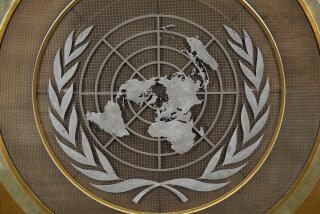Deeds Must Back Words in Detente With U.N.
- Share via
The U.N. General Assembly has convened for its 43rd annual session under auspices more favorable than in many years. In old, time-encrusted conflicts in Asia and Africa the United Nations has made possible a new try for peace. The new spirit in Soviet-American relations has softened East-West friction and has distinctly lowered the noise level of dispute. And Washington, after nearly eight years of kicking the United Nations around as useless, wasteful and anti-American, has suddenly found not only words of praise, but also money to back them up. Nevertheless, the joy is not exactly uncontained.
When President Reagan addresses the General Assembly Monday he will have assured himself a friendly reception. Two weeks ago, he ordered payment of $188 million, part of the U.S. debt to the United Nation’s regular budget. Congress and the Administration had withheld payment in order to stop the assembly’s escalating practice of voting money for pet projects, which the United States and the other major contributors then had to provide for. Washington also wanted to fry quantities of fat out of the U.N. bureaucracy.
The process of reform was begun in 1986, rigorously pursued in 1987 and continued this year. But it appears that President Reagan was unaware of this until Secretary-General Javier Perez de Cuellar visited the White House last July and hit him with the stark truth: If the United States failed to pay, the United Nations would go bankrupt; the lights would literally go out at U.N. headquarters before the end of the year.
Reagan has declared his intention to pay an additional $520 million in arrears to the U.N. system as a whole, saying that the United States should henceforward annually contribute its full share. But the $188 million that he authorized this month will keep the United Nations afloat for only three months. In January, Reagan departs, leaving it to his successor and the future Congress to pay the rest of the debt.
It is a matter of great satisfaction in New York that the President recognized “the renewed effectiveness of the United Nations as an organization serving the cause of world peace and stability,” adding that the U.N. peacekeeping efforts are “directly serving important long-term objectives of this Administration to end regional conflicts and advance peace and freedom around the world.” However, if the necessary funds are not forthcoming the words are empty. All the more so, since the full array of peacekeeping operations that the world community may ask the United Nations to undertake or continue in the next year could cost up to $2 billion.
The United Nations’ “renewed effectiveness” that Reagan praised is seen in half a dozen cases: the Iran-Iraq war, Afghanistan, Cambodia, Namibia, Western Sahara and Cyprus. No miracles. Not one of these conflicts has been resolved and may not be for years more. What the organization has done is to offer a face-saving way out for those combatants who want it. They are given a political framework for a peaceful settlement drawn up by the world community in the Security Council or the General Assembly and brought to them by the secretary-general in endlessly patient mediation. They must then flesh it out as best they can. The United Nations cannot impose political solutions.
President Reagan’s acknowledgment that the United Nations can further American interests comes at a time when the Soviet Union is moving in high gear down that same road. A year ago, when Washington’s rating of the United Nations was at low ebb, Mikhail S. Gorbachev proposed that the organization and the secretary-general be given greater authority and a central role in world efforts for peace and cooperation. He advocated more U.N. peacekeeping operations and military observers.
It is a far cry from the grim Gromyko days when the Soviet Union was the odd man out, casting more than 100 vetoes, fighting the West tooth and nail and refusing to pay for programs--especially peacekeeping--that it did not favor. Last year it promised to pay all its considerable arrears and has, in fact, been making the payments.
If the Soviet Union is not the evil empire, neither is it the tooth fairy. It wants to enlarge and shape U.N. functions to serve its interests and to bar exclusion. As a member state, it is a party to anything the United Nations does. This year again it is working hard in the General Assembly to capitalize on its standing with Third World countries, especially in disarmament and development issues. Many of today’s problems--environmental catastrophe and gradual degradation, regional conflicts, disease and drugs--exceed the capacity even of superpowers and cry out for multilateral solutions. The General Assembly has no power, but it can express a consensus on how, or how not, to approach them.
It is time that the United States put into practice what President Reagan has now put into words, something the Soviet Union understands. The consensus can be shaped and directed not by the go-it-aloners or the odd men out but by those who know how to conduct public diplomacy on a global scale--in the United Nations.
More to Read
Sign up for Essential California
The most important California stories and recommendations in your inbox every morning.
You may occasionally receive promotional content from the Los Angeles Times.









